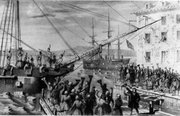Boston Tea Party
|
|
The Boston Tea Party was a political protest by Boston, Massachusetts residents against the British parliament. It is one of the key national myths of the founding of the United States and a key point in the American revolution.
Die_Einwohner_von_Boston_werfen_den_englisch-ostindischen_Thee_ins_Meer_am_18._December_1773.jpg
The 1765 Stamp Act and the 1767 Townshend acts incensed passions regarding British decisions on taxation of the colonies with no corresponding representation in the Westminster Parliament ("no taxation without representation"). One of the protesters was John Hancock. In 1768, his sloop Liberty was seized by customs officials and he was charged with smuggling. He was defended by John Adams and eventually the charges were dropped, though he later faced several hundred more indictments.
Hancock organized a boycott of tea from China sold by the British East India Company, whose sales in the colonies then fell from 320,000 pounds to 520 pounds. American women played a large part in the boycott and it was one of the first times women collectively attempted to influence public policy in the Colonies. By 1773 the Company had large debts, huge stocks of tea in its warehouses, and no prospect of selling it because smugglers such as Hancock were importing tea without paying duty. The British Government passed the Tea Act, which allowed the East India Company to sell tea to the colonies without the usual colonial tax, thereby allowing them to undercut the prices of the colonial merchants and smugglers.
The ships carrying tea were prevented from landing as most American ports turned the tea away; at Boston however, the East India Company had the assistance of the governor—preparations were made to forcibly land the tea under the protection afforded by British armed vessels.
On December 16, 1773, the night before the tea was due to be landed, the Sons of Liberty, a group of about 60 local Boston residents, possibly organized by Samuel Adams, burst from the South Meeting House and headed toward Griffin's Wharf, dressed as Mohawks. There, three ships—the Dartmouth, the Eleanor and the Beaver—were loaded with crates of tea. The men boarded the ships and began destroying the cargo. By 9 PM, with only one incident, they had smashed 342 crates of tea in all three ships and had thrown them into Boston Harbor. They took off their shoes, swept the decks, and made each ship's first mate attest that they had destroyed only the tea. The whole event was remarkably quiet and peaceful.
This act drew criticism from colonial and British figures. For instance, Benjamin Franklin stated that the destroyed tea must be repaid and offered to repay with his own resources. The British Government responded by closing the port of Boston (see Intolerable Acts).
The Boston Tea Party was one event which led up to the American Revolutionary War.
External links
- "The Destruction of Tea at Boston Harbor." 1773. Copy of lithograph by Sarony & Major, 1846. (PD) (http://teachpol.tcnj.edu/amer_pol_hist/thumbnail22.html) -- large version (http://teachpol.tcnj.edu/amer_pol_hist/fi/00000016.htm)
- Broadside against the British East India Company (PD) (http://teachpol.tcnj.edu/amer_pol_hist/thumbnail21.html) -- large version (http://teachpol.tcnj.edu/amer_pol_hist/fi/00000015.htm)
- "The Boston Tea Party, 1773," EyeWitness to History (http://www.eyewitnesstohistory.com/teaparty.htm)
- "Affair of the Sloop Liberty" (http://www.generalatomic.com/AmericanHistory/sloopliberty.html)
Other meanings
- The Boston Tea Party was the title of a song by Alex Harvey
- The Boston Tea Party was also the name of a would-be psychedelic band who made a sole LP for Flick Disc, a subsidiary of MGM, in 1968.
- Boston T. Party is the pen name of the author of several controversial fiction and non-fiction books, including Boston's Gun Bible and Molon Labe.

